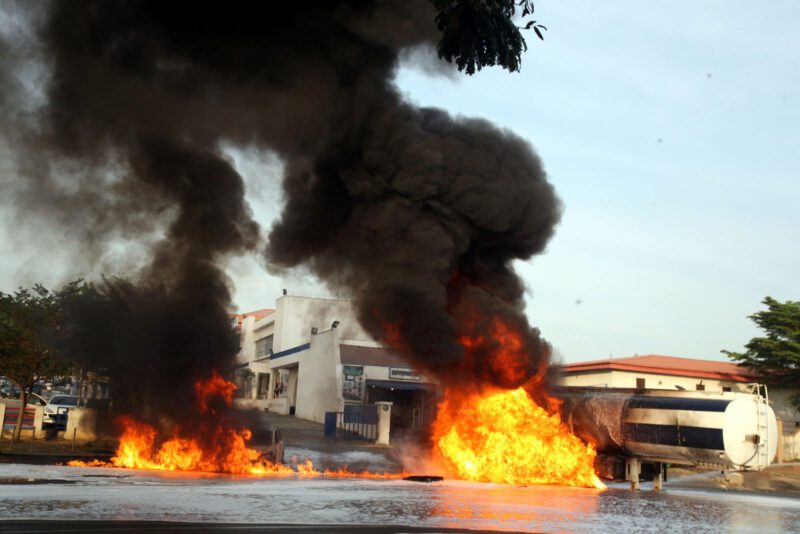Breaking News
Tanker explosions claimed 3,445 lives in 15 years
The most recent major tragedies occurred on January 18, 2025, when a fuel tanker exploded near Dikko Junction in Suleja, Niger State, killing at least 98 people and on January 25, 2025, at Ugwu Onyeama in Enugu State in which over 20 people were burnt alive.

Nigeria’s roads have become a killing field, with fuel tanker crashes and fires claiming thousands of lives over the past 15 years.
The statistics are staggering: About 3,445 people, according to data independently collected by Sunday Vanguard, lost their lives in the crashes, leaving behind grieving families and shattered communities.
The sheer scale of the tragedy is a damning indictment of the country’s transportation infrastructure and the lax safety standards that have allowed these disasters to occur with alarming frequency.
The human cost is incalculable, but the economic toll is also significant.
The destruction of property, loss of livelihoods, and the strain on emergency services all take a heavy toll on the nation’s resources.
Tankers play a crucial role in the transportation of petroleum products across the country, but frequent accidents involving them — often accompanied by fires and explosions — remain a persistent danger.
Sadly, despite the high frequency of the crashes, there is a notable lack of adequate data to study and understand the pattern of petroleum tanker accidents in the country.
This has made it challenging for relevant stakeholders to implement effective strategies for preventing these incidents.
The economic toll of the accidents is also substantial, as they often result in the destruction of property, including homes, businesses and vehicles, worth billions of naira.
In this report, Sunday Vanguard reviews fuel tanker accidents in Nigeria from January 2010 to January 2025 and reports that the period under review saw a staggering number of accidents, including over 2,500 tanker crashes and about 3,445 fatalities.
The most recent major tragedies occurred on January 18, 2025, when a fuel tanker exploded near Dikko Junction in Suleja, Niger State, killing at least 98 people and on January 25, 2025, at Ugwu Onyeama in Enugu State in which over 20 people were burnt alive.
These latest incidents underscore the alarming death toll associated with tanker accidents in the country.
Deadly Incidents
One of the deadliest incidents occurred on October 15, 2024, in Majia, Jigawa State, where an explosion from an overturned tanker killed 181 people.
This marked 2024 as the deadliest year for tanker-related accidents, with a total of 266 fatalities.
Noteworthy incidents also include the 2019 Onitsha, Anambra State explosion, where a petrol-laden tanker crashed, resulting in the death of five people and the destruction of over 40 buildings.
Another explosion occurred in Lagos State on June 27, 2018, when a tanker fell on the Otedola Bridge, causing a fire that killed over 10 people and destroyed more than 50 vehicles.
In Benue State on July 2024, a petrol tanker explosion killed at least 45 people and injured over 100 when locals attempted to scoop fuel from the wreckage.
On January 2019, a tanker explosion in the Odukpani area of Cross River State killed approximately 60 people who were trying to collect spilt fuel.
A similar incident occurred in Rivers State in July 2012 when a tanker accident resulted in 104 deaths when people tried to scoop fuel from a tanker after it crashed.
Breakdown
A breakdown of accident statistics reveals a troubling trend in fatalities, with 2019 recording 173 deaths and 161 injuries.
The year 2020 saw over 1,500 fuel tanker accidents, claiming at least 535 lives. Other years with significant accidents include:
2010: 461 accidents
2011: 180 accidents
2012: 179 accidents
2013: 315 accidents
2014: 271 accidents
2015: 331 accidents
2016: 359 accidents
2017: 308 accidents
As Nigeria struggles to develop its economy and improve the lives of its citizens, it is clear that addressing the scourge of fuel tanker crashes must be a priority. But what are the root causes of these disasters, and what can be done to prevent them?
The incessant petrol tanker crashes have been attributed to several factors.
According to findings, top in the list are scooping of fuel from fallen tankers, recklessness of drivers, deplorable roads, non-adherence to road traffic safety practices, inadequate driver’s training/certification and retraining, non-adherence to safe laden/haulage practices /standards; and ageing trucks and lack of fleet renewal programmes, among others.
The Federal Road Safety Commission (FRSC) revealed that 411 persons lost their lives as a result of scooping fuel from fallen tankers nationwide in 2024.
Shehu Mohammed, the FRSC corps marshal, explained that the key contributor to the high death toll in the country was the dangerous act of scooping fuel from crashed tankers.
“It is pertinent to emphasise at this juncture that, out of the total fatalities that occurred in 2024, 411 deaths, representing 7.6 per cent of the total deaths, were not primarily caused by the crashes but a secondary factor, which is the very monster we are fighting today: scooping of fuel from fallen tankers”, Mohammed said recently.
He, however, attributed the increased deaths to human factors such as reckless driving, overloading, and fatigue.
Other stakeholders, including the National Emergency Management Agency (NEMA), the Nigeria Union of Petroleum and Natural Gas Workers (NUPENG), the umbrella body of tanker drivers, and the Petroleum and Natural Gas Senior Staff Association of Nigeria (PENGASSAN), attributed tanker fire accidents to several factors such as bad roads, drug addiction and recklessness on the part of tanker drivers.
Comrade Afolabi Olufemi, General Secretary of NUPENG, blamed the development on human, mechanical and environmental factors.
“In terms of the human factor, we talk about the behaviour of the driver himself. How does he handle the steering?” Olufemi said.
On the mechanical factor, he decried the influx of fake spare parts in the market, which he said triggered the failure of some of the tankers on the highway.
The NUPENG scribe said the state of the Nigerian highways is terrible.
“Before you take a trip from Lagos to Calabar or Maiduguri and come back, your vehicle is in a total state of disrepair. This is one of the contributing factors”, Olufemi added.
“Aside from that, there is the menace of Area Boys in Lagos. They mount on the truck to demand a bribe from the driver and threaten to decouple the tanker from the truck. This can be attributed to the incessant falling of trucks on Otedola Bridge.
“And when you see fire happening as a result of a tanker crash, it is because people go there to scoop fuel. In the course of that, they trigger off the fire. So it is beyond the tanker drivers”.
Also speaking, General Secretary of PENGASSAN, Comrade Lumumba Okugbawa, flayed the state of Nigerian roads. Okugbawa noted that deplorable road infrastructure, such as potholes and poorly maintained highways, exacerbates the risk of tanker accidents.
He said the movement of petroleum by rail remains the best solution to reduce the crashes, noting that a train movement for instance could take more than 30 tankers off the road.
Timothy Iwuagwu, President of the Institute of Safety Professionals of Nigeria, on his part, said that many tankers are not designed according to international best practices to avoid spillage during accidents.
“There are also not enough awareness campaigns, (and) people are not willfully compliant with safety measures when such accidents happen”, the safety expert said.
Way out
Several agencies and stakeholders are working to mitigate the dangers posed by petroleum tanker accidents.
The FRSC said it has established commands at tank farms to inspect tankers before they are allowed to load and transport petroleum products.
Additionally, the commission disclosed that it has implemented special interventionist operations and mobile court sessions to deter dangerous practices like fuel scooping.
Other stakeholders, including the NUPENG and the PENGASSAN, emphasize safety training for drivers, which includes collaborative workshops with traffic agencies, emergency services, and mental health professionals.
Meanwhile, experts advocate a multifaceted approach involving improved road safety practices, better driver training, enhanced enforcement of safety standards, and investment in modern transportation infrastructure, better adherence to international safety standards, particularly regarding tanker design and maintenance to address the ongoing crisis.
The adoption of modern trucks, installation of speed limiters, and investment in rail transportation to move petroleum products are also recommended to reduce reliance on road haulage.
They also called the government, alongside relevant stakeholders, to work collaboratively to reduce the occurrence of these accidents and mitigate their impact on the public and the economy.










